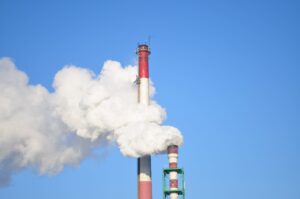Physical Address
23,24,25 & 26, 2nd Floor, Software Technology Park India, Opp: Garware Stadium,MIDC, Chikalthana, Aurangabad, Maharashtra – 431001 India
Physical Address
23,24,25 & 26, 2nd Floor, Software Technology Park India, Opp: Garware Stadium,MIDC, Chikalthana, Aurangabad, Maharashtra – 431001 India

By Vivek Saini
As global temperatures and greenhouse gas emissions reach unprecedented levels, the most recent Emissions Gap Report from the UN Environment Programme (UNEP) reveals a concerning projection. Current commitments made under the Paris Agreement indicate that the world is heading towards a substantial temperature rise of 2.5-2.9°C above pre-industrial levels within this century. This alarming scenario underscores the pressing necessity for intensified climate action to avert the impending crisis.
Alarming Trends and Urgent Mitigation
The climate summit in Dubai may have wrapped up two weeks ago, but the echoes of “Broken Record,” the sobering UN report, still reverberate. The stark reality revealed – soaring temperatures, rising emissions, and an ever-widening gap between pledges and action – demands an immediate shift towards low-carbon transformations.
The report bears the stark numbers: to avoid catastrophic warming, we need to slash predicted 2030 greenhouse gas emissions by 28% for a 2°C pathway and a staggering 42% for 1.5°C. UN Secretary-General Guterres’ call to action remains urgent: “The poisoned root is fossil fuels. We must transition to renewables, equitably and justly.”
The fate of the Paris Agreement temperature goals hangs in the balance. This decade is our critical window to ramp up emission reductions and set significantly more ambitious targets for 2035. Achieving net-zero pledges, now covering 80% of global emissions, hinges on immediate and decisive action.
The Dubai summit concluded with a chorus of pledges and commitments, but now comes the actual test: translating words into deeds. The world cannot afford another broken record. This is the moment to break free from fossil fuels, embrace low-carbon pathways, and build a sustainable future before the window closes.
Bridging the Ambition Gap and Record-Breaking Climate Events
Global temperatures have set concerning records, with 86 days surpassing 1.5°C above pre-industrial levels by October, making September the hottest month at 1.8°C higher. Concurrently, the Emissions Gap Report unveils an alarming 1.2% rise in global greenhouse gas emissions to a record 57.4 GtCO2e in 2022, reflecting global inequalities. The trajectory indicates a potential overshooting of agreed climate goals this century.
Current mitigation efforts, if sustained, restrict global warming to 3°C. Implementing unconditional Nationally Determined Contributions (NDCs) slightly improves this, targeting a 2.9°C limit. Fulfilling conditional NDCs could cap temperatures at 2.5°C with a 66% chance. These figures, marginally higher than the 2022 report, reveal a daunting scenario.
Achieving the Paris Agreement goals demands a substantial 43% cut in 2030 emissions, emphasizing the critical need for intensified climate action.
Low-Carbon Development and Future Outlook
The report advocates for the global adoption of economy-wide, low-carbon development transformations, centring on the imperative energy transition. Notably, coal, oil, and gas extraction from existing and planned sources pose a significant threat, potentially emitting over 3.5 times the carbon budget for limiting warming to 1.5°C and nearly exhausting the budget for a 2°C limit.
Addressing this challenge requires high-income and high-emitting nations, particularly within the G20, to undertake more ambitious and immediate actions. These nations must also provide crucial financial and technical support to developing countries. With low- and middle-income nations already contributing over two-thirds of global greenhouse gas emissions, prioritizing low-emission growth to meet development needs becomes paramount. This involves addressing energy demand patterns and giving precedence to clean energy supply chains.
The report emphasizes the importance of the first Global Stocktake (GST) concluding at COP28. This process will guide the formulation of the next round of Nationally Determined Contributions (NDCs) due in 2025, setting targets for 2035. Global ambition in this next round must align with two °C and 1.5°C pathways, ensuring compensation for excess emissions until these pathway-consistent levels are attained.
References:
Banner image:
https://www.pexels.com/photo/smoke-stacks-against-blue-sky-257775/